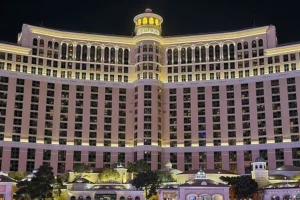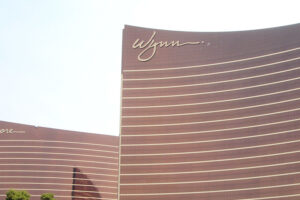MGM Resorts’ Osaka Plans in Trouble Over LeoVegas Purchase

Las Vegas-based global casino giant MGM Resorts International has found itself embroiled in controversy this week in Japan.
An anti-Integrated Resort (IR) group says that the company profited from illegal online gambling operations in Japan through its acquisition of LeoVegas, which invalidates its license to build a planned casino resort in Osaka (rendering pictured).
MGM won Japan’s first casino license earlier this year, and is looking to build an $8.1 billion integrated casino resort on an artificial island in Osaka Bay.
However, local activists have highlighted the Japanese-market focused operations of LeoVegas, which ended shortly before MGM completed its $600 million purchase in 2022.
They say that invalidates MGM for the casino partnership, as its subsidiary had previously broken Japanese law targeting its citizens when online gambling is illegal in the country.
The allegation was “completely unacceptable because it is unfounded and may lead to misunderstanding,” according to MGM Resorts Japan in a statement on its website.
Related: Samurai’s Path slot, reviewed and rated
Clearly Confirmed
The group that has spoken out with these new concerns is known as the “Society for Considering Gambling Addiction Problems” (SCGA). It has called for the revocation of MGM’s Osaka IR certification and the suspension of any development plans.
The group alleges that LeoVegas unlawfully provided online gaming operations, including an online casino, targeting Japanese citizens. The SCGA claims that MGM has profited from such illegal activities.
And indeed, it does have a point. LeoVegas and its brand Royal Panda both openly advertised their presence in Japan up until a month before the MGM acquisition.
However, the question is, does LeoVegas’ previous infringements under Japanese law also apply to MGM?
“The approval of the Osaka IR plan by the Minister of Land, Infrastructure, Transport and Tourism is premature, and the approval of the plan should be revoked until it is clearly confirmed that MGM has not taken in LeoVegas’ criminal proceeds,” the group’s statement said.
MGM’s Response and Implications
The company clarified that before completing its acquisition of LeoVegas, it asked them to stop serving Japanese customers.
“Before completing its acquisition of LeoVegas, MGM asked LeoVegas to block access to its site from within Japan. Therefore, MGM evaluated the acquisition of LeoVegas based on the company’s business and operating conditions excluding the Japanese market,” MGM Japan’s statement said.
Whatever the final outcome of these allegations, it is not a good look for MGM when so-called integrated resort casinos are already controversial.
Public support is decidedly not in favor of casino resorts across Japan, and scuffles almost broke out during debates on the Integrated Resort Implementation Act.
If MGM’s bid were to be invalidated, Osaka and Japan would have to find another suitor.
The Las Vegas giant was one of several global operators competing for licenses in what would be a virtual monopoly on a potentially huge global market, including fellow U.S. operator Las Vegas Sands.
Many potential casino operators dropped out during the laborious licencing application and tender process.
As well as a potential casino in Osaka, Japan, and its resorts in Las Vegas and across the U.S., MGM’s global presence is completed with its resort properties in the Chinese special administrative region of Macau.











